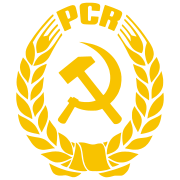More languages
More actions
m (Added infobox.) Tag: Visual edit |
(Using updated parameters (from political_line to political_orientation)) |
||
| Line 1: | Line 1: | ||
{{Infobox political party|name=Romanian Communist Party|native_name=Partidul Comunist Român|logo=PCR logo.png|founded=8 May 1921|leader1_title=Notable Leaders|leader1_name=[[Nicolae Ceaușescu]]|dissolution=22 December 1989|newspaper=The Spark|youth_wing=Union of Communist Youth| | {{Infobox political party|name=Romanian Communist Party|native_name=Partidul Comunist Român|logo=PCR logo.png|founded=8 May 1921|leader1_title=Notable Leaders|leader1_name=[[Nicolae Ceaușescu]]|dissolution=22 December 1989|newspaper=The Spark|youth_wing=Union of Communist Youth|political_orientation=[[Marxism-leninism]]<br>[[National communism]]<br>[[Anti-revisionism]]}} | ||
The '''Romanian Communist Party''' (''Partidul Comunist Român''), was the ruling party from 1953 to 1989 of [[Socialist Republic of Romania (1947–1989)|Romania]]. | The '''Romanian Communist Party''' (''Partidul Comunist Român''), was the ruling party from 1953 to 1989 of [[Socialist Republic of Romania (1947–1989)|Romania]]. | ||
Revision as of 13:18, 14 November 2022
Romanian Communist Party Partidul Comunist Român | |
|---|---|
 | |
| Notable Leaders | Nicolae Ceaușescu |
| Founded | 8 May 1921 |
| Dissolved | 22 December 1989 |
| Newspaper | The Spark |
| Youth wing | Union of Communist Youth |
| Political orientation | Marxism-leninism National communism Anti-revisionism |
The Romanian Communist Party (Partidul Comunist Român), was the ruling party from 1953 to 1989 of Romania.
History
The party was founded in 1921 after the Socialist Party of Romania split into the Romanian Communist Party and the Romanian Social Democratic Party. Before World War II, many communists were targeted and imprisoned by the Romanian monarchy[1] and the Communists were harshly persecuted by the fascist leader Ion Antonescu during the war.[2] After Romania was liberated by the Red Army, Gheorghe Gheorghiu-Dej became the leader of the party and Romania became a socialist state. Gheorghiu-Dej died of cancer in 1965 and was succeeded by Nicolae Ceaușescu. In 1989, after Radio Free Europe incited a counterrevolution in Romania, Ceaușescu was executed
| Part of a series on |
| Communist parties |
|---|
and the party was dissolved.[3]
References
- ↑ Diana Condrea. "100 Years in the History of Romania" Uncover Romania.
- ↑ C. Bărbulescu et al. (1971). File din istoria U.T.C (Romanian: File din istoria U.T.C) (p. 199). Bucharest.
- ↑ Encyclopædia Britannica (2021).
